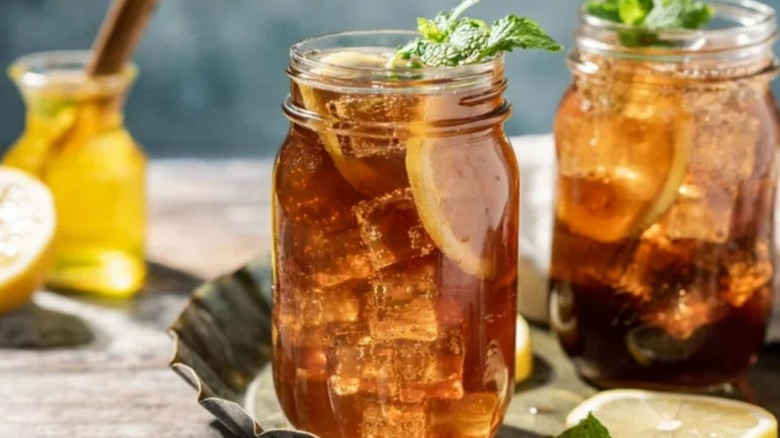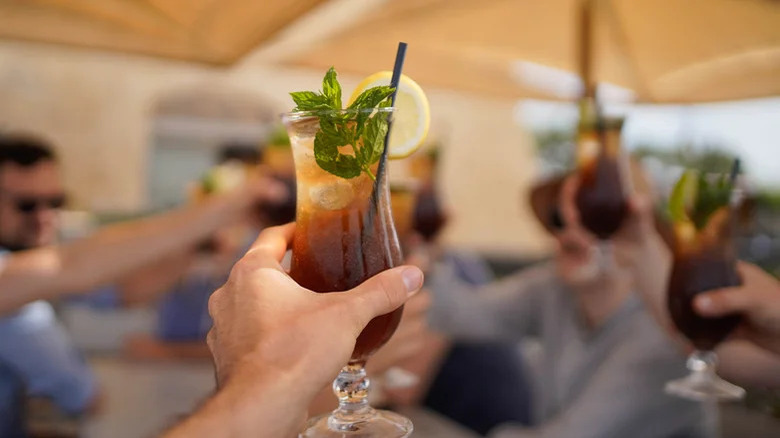Why Ordering A Long Island Iced Tea Is A Red Flag For Bartenders
Sweet and refreshing, a Long Island iced tea can work as a creatively inspired pairing for just about any assertively spiced cuisine, including American barbecue, Indian, and Thai. But as much as this cocktail might complement an order of smoky ribs, paneer tikka masala, or pad Thai, the truth is that for many of its fans, the allure has nothing to do with gastronomy. Rather, this cocktail is known for quickly taking the drinker from zero to inebriated. In fact, it's arguable that the Long Island iced tea is one of the least likely cocktails to be paired with food at all.
That might explain why Brooklyn's casual-trendy restaurant Wenwen offers a stealth version for pairing with its foodie-endorsed Taiwanese dishes (per Thrillist). And when we say stealth, we mean that at Wenwen, this drink goes by another moniker entirely: the Shyboy. According to Wenwen's beverage director, Morgan Robison, the Shyboy tweaks the classic's five essential distilled spirits (vodka, gin, rum, tequila, and triple sec) by swapping in smoky mezcal and cherry-and-bitters tinged Amaro Montenegro for the classic's more neutral tequila and orange-flavored triple sec. Nevertheless, Robison has made it clear he intends for the Shyboy to stand in as an elevated version of the classic.
Indeed, we've heard it suggested the Long Island iced tea's rowdy reputation may have some bar proprietors feeling less than jazzed about including it by name on their menus. Moreover, it would appear a good number of bartenders would rather not even serve them. In fact, when someone orders a Long Island iced tea, some bartenders actually consider it a red flag.
The Long Island iced tea is known to induce not-so-admirable behavior
Although the Long Island iced tea is regarded by some as an express train to intoxication, it's also very much a legitimate cocktail. In fact, you'll find it on the core curriculum at bartending schools. But that's not to say the Long Island iced tea doesn't fall squarely within the category of drink orders that raise the red flag for bartenders.
As Wenwen's Robison explained to Thrillist, "For the most part, [the Long Island iced tea] is for people who are here to drink and think, 'This is the fastest way to get to where I'm going.'"
There's not anything wrong with that, necessarily. It's just that some bartenders have learned from hard-won experience that patrons who want to get as drunk as possible as quickly as possible, tend to do precisely that — and often quite obnoxiously.
In a round-up of Reddit comments, it was clear bartenders don't regard the drink order highly. One bartender said that a customer who orders a Long Island iced tea is "usually someone who wants to get drunk for cheap and is going to complain that the drink is not strong enough" (via Buzzfeed).
Adding insult to injury, it's not as if making a Long Island iced tea doesn't require considerable time and effort. Most Long Island Tea Recipes contain no fewer than eight separate ingredients — not including the ice. Five of those are spirits, and since customers sometimes request by name, that can make the experience even more work-intensive for the bartender, depending on how their spirit shelves are organized.
What is it about the Long Island iced tea?
A single serving of Tasting Table recipe developer Michelle McGlinn's Long Island Iced Tea Recipe consists of half-ounce of each of the essential five distilled spirits mentioned above. These are shaken with or poured over ice into a tall glass and topped off with a half-ounce of lemon juice and two ounces of cola before being garnished with a lemon wedge (a sprig of mint or basil — or any zesty herb, for that matter, is optional). Altogether, the Long Island iced tea has more than twice the alcohol of what the National Institute on Alcohol Abuse and Alcoholism considers to be one standard alcoholic beverage (i.e., one and one-half ounces of distilled spirits).
But, for many fans, the "magic" of the Long Island iced tea is that despite the total absence of any tea at all, the end result of this prominent and motley assortment of distinctly flavored spirits tastes quite a lot like iced tea with lemon. In fact, the drink's five-alarm alcohol punch is barely detectable to the naked tongue, even less so after the first round. That's a boon to those who enjoy alcohol's effects more than its taste. But as fun as that might be for those drinking, it can be considerably less so for the bartender whose job it is to do business with them, and in some cases, tell them when it's time to stop.


